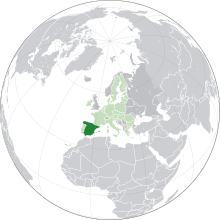မိူင်းသပဵၼ်ႇ
Appearance
| မိူင်းသပဵၼ်ႇ | |||||
|---|---|---|---|---|---|
| |||||
ဢွင်ႈတီႈ မိူင်းသပဵၼ်ႇ (ၶဵဝ်ၸမ်ႉ) – ၼႂ်း ၵုၼ်ယူးရူပ်ႉ (ၶဵဝ် လႄႈ ၶွၼ်ႉၸမ်ႉ) | |||||
| ဝဵင်းငဝ်ႈၸိုင်ႈ | မႅတ်ႉတရိတ်ႉ 40°26′N 3°42′W / 40.433°N 3.700°W | ||||
| ၽႃႇသႃႇၵႂၢမ်း ၸႂ်ႉၼႂ်းလုမ်း | သပဵၼ်ႇ | ||||
| ၸၢဝ်းၶိူဝ်း (2019) | |||||
| လွင်ႈၵိူဝ်းယမ် |
| ||||
| Demonym | |||||
| မဵဝ်းမိူင်း | Unitary parliamentary constitutional monarchy | ||||
| လူင်ပွင်ၸိုင်ႈ | |||||
• ၶုၼ်ႁေႃၶမ်း | Felipe VI | ||||
• ၸွမ်ၽွင်းလူင် | Pedro Sánchez | ||||
| ပိုၼ်ႉတီႈ ဢၼ်ပိူင်ႇ | |||||
• ႁူမ်ႈ | (ၸၼ်ႉ: 51st) | ||||
• ၼမ်ႉ (%) | 1.04 | ||||
| ႁူဝ်ၼပ်ႉၵူၼ်း | |||||
• 2019 လၢမ်း | |||||
• လွင်ႈသတ်ႉႁူဝ်ၼပ်ႉၵူၼ်း | (ၸၼ်ႉ- 112th) | ||||
| GDP (PPP) | လၢမ်း 2020 | ||||
• ႁူမ်ႈ | |||||
• Per capita | |||||
| GDP (nominal) | လၢမ်း2020 | ||||
• ႁူမ်ႈ | |||||
• Per capita | |||||
| Gini (2018) | ၵၢင် · 103rd | ||||
| HDI (2018) | 0.893[8] သုင်ႁႅင်း · 25th | ||||
| ငိုၼ်းတွင်း | Euro[မၢႆတွင်း 3] (€) (EUR) | ||||
| ၶၢဝ်းယၢမ်းၼႃႈလိၼ် | WET and CET (UTC±0 to +1) | ||||
• ၶၢဝ်းမႆႈ (DST) | WEST and CEST (UTC+1 to +2) | ||||
| Note: most of Spain observes CET/CEST, except the Canary Islands and Plazas de soberanía which observe WET/WEST.
| |||||
| ပိူင်ဝၼ်းတီႈ | dd/mm/yyyy (CE) | ||||
| ပိူင်သၢႆလူတ်ႉ | မိုဝ်းၶႂႃ | ||||
| ၶူတ်ႉတႄႇလီႇၾူင်း | +34 | ||||
| ၶူတ်ႉISO 3166 | ES | ||||
| Internet TLD | .es[မၢႆတွင်း 4] | ||||
မၢႆတွင်း
[မႄးထတ်း | မႄးထတ်းငဝ်ႈငႃႇ]- ↑ 11.3% Atheist, 7.6% Agnostic and 8.2% non-believer.[2]
- ↑ As of 1 July 2019, the Spanish population increased in 163,336 in the first half of 2018, reaching a number of 47,100 million inhabitants. In the same month the number of citizens with Spanish citizenship reached 42,069,312. The number of foreigners (i.e. immigrants, ex-pats and refugees, without including foreign born nationals with Spanish citizenship) permanently living in Spain was estimated to be at 5,023,279 (10.7%) in 2019.[5]
- ↑ The Peseta before 2002.
- ↑ The .eu domain is also used, as it is shared with other European Union member states. Also, the .cat domain is used in Catalan-speaking territories, .gal in Galicia and .eus in the Basque-speaking area.
ၽိုၼ်ဢိင်
[မႄးထတ်း | မႄးထတ်းငဝ်ႈငႃႇ]- ↑ Presidency of the Government (11 October 1997). Real Decreto 1560/1997, de 10 de octubre, por el que se regula el Himno Nacional (in Spanish). Boletín Oficial del Estado núm. 244. Archived from the original on 24 September 2015။
- ↑ CIA – The World Factbook – Spain. Cia.gov. Archived from the original on 18 May 2020။ Retrieved on 24 February 2014။
- ↑ Anuario estadístico de España 2008. 1ª parte: entorno físico y medio ambiente. Archived from the original on 24 September 2015။ Retrieved on 14 April 2015။
- ↑ https://www.ine.es/prensa/cp_j2019_p.pdf
- ↑ Population Figures at 01 July 2019. Migrations Statistics. First half of 2019. (in es). National Statistics Institute (INE) (January 2020). Archived from the original on 28 June 2017။
- ↑ 6.0 6.1 6.2 6.3 World Economic Outlook Database, October 2019. International Monetary Fund.
- ↑ Gini coefficient of equivalised disposable income – EU-SILC survey. Eurostat.
- ↑ Human Development Report 2019 (PDF) (in en). United Nations Development Programme (10 December 2019). Archived from the original on 30 April 2020။ Retrieved on 10 December 2019။




